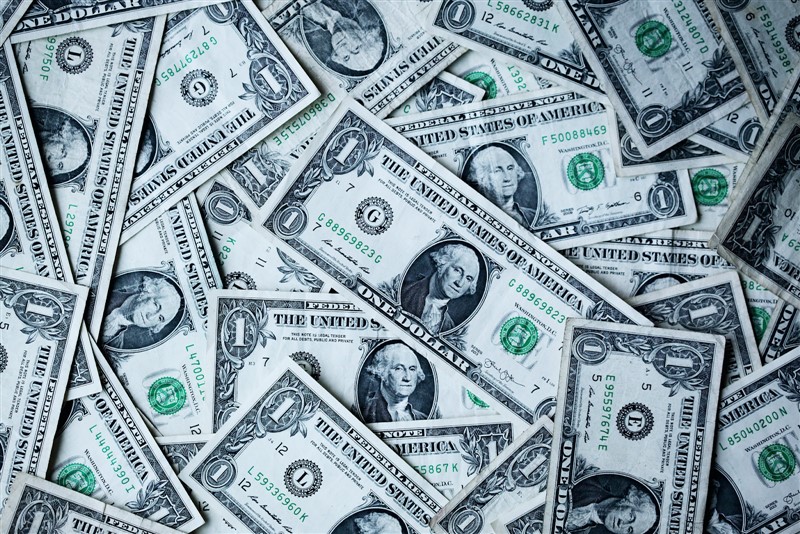Money is typically a mass noun, which means it gets used with some and not with a, and lacks a plural form. However in some scenarios, especially when it refers to discrete sums of money obtained from a particular source or allocated to a particular cause, money can be pluralized as moneys or monies, with the latter being the more common spelling.
In most instances, we treat money as a mass noun or noncount noun—just like oxygen or mud or honesty. You can’t have a single mud or four honesties, and in the same vein, we don’t say a money or one money or twenty-six moneys. Even though it can be composed of discrete bills and coins, countable dollars and cents, the concept of money is treated as a mass in English. You either have money or you don’t.
Plural Mass Nouns
However, like common mass nouns such as water and sand, there are occasions when money is inflected with a standard plural, like any count noun. It tends to occur when the reference is to discrete sums of money, obtained from a particular source or allocated to a particular cause.
There are occasions when ‘money’ is plural.
The spelling in these instance can be moneys or, more commonly, monies:
Some of the 2009 stimulus monies for high-speed rail should end up in the California project and more may be coming.
—James McCommons, Waiting on a Train, 2009Under Oregon’s unique «kicker» law, if general fund revenue tops projections by more than 2 percent, the entirety of the above-projection moneys goes back to taxpayers in the form of a rebate.
—Connor Radnovich, The Statesman Journal (Salem, Ore.), 23 Aug. 2017The West Virginia Department of Health and Human resources announced it will use $22 million in settlement monies received from drug distributors to combat the drug epidemic in West Virginia.
—Kara Leigh Lofton, West Virginia Public Broadcasting, 21 Aug. 2017The mood today is slightly less worshipful, and the reason is simple. Voters are tired of using public monies to enrich millionaire sports owners.
—Carl Hiaasen, Kick Ass, 1999
Correct Spelling
Most nouns that end in –ey take a standard -s plural: monkeys, chimneys, attorneys, turkeys. Moneys naturally follows that pattern. Some usage critics decry the spelling monies because it encourages a pronunciation akin to the plural nouns ponies or cronies, as though the singular noun were actually spelled mony. These days, however, monies is in fact the more common spelling.
Which Type of Noun is Money?
To first understand a word, its history, and how to use it properly, it is important to first define what it actually means. According to the Merriam Webster Dictionary, the word money is defined as “something generally accepted as a medium of exchange, a measure of value, or a means of payment” or “wealth reckoned in terms of money.” In total, there are twelve different accepted definitions of the word money, all related to wealth and/or currency.
Part of what makes English such a difficult language to master is that no matter where you look, there are rules, and then there are exceptions to those rules. For example, the common rule for making the past tense in English is to add “-d” or “-ed” to a verb to give it the past tense. For example, the verb cook becomes cooked, and the verb bake becomes baked. In both situations, you either add the “-ed” or the “-d” suffix, and the word is past tense.
Many plurals follow a similar rule: to create a plural, add “-es” or just “s” to the current word. However, the word money has a somewhat irregular plural form. When a word ends in “y,” sometimes the letter is treated as a consonant and sometimes a bowl, which affects what the plural word would be. To create the plural of money, you actually remove the “e” and the “y” and add “-ies” to the end. So instead of the plural form of money being “moneys.” it is “monies.”
You also want to avoid the common error of adding an apostrophe. That being said, in the modern American usage, there is a common idiom that you “want to get your money’s worth,” meaning that you want to get everything that you pay for.
The word money is actually both a countable and an uncountable noun (or mass noun), meaning that you can have both “many monies” and “large sums of money.” The difference is that the countable noun of “money” is individual kinds of currency, and the other describes a quantity of a single form of currency. For example, you wouldn’t say that you have “a money.”
How Do You Use the Word Monies?
The word monies falls under a very specific use case, and it is used to describe a context in which you have several different types of currency, or you have one currency in different contexts or amounts. For example, you could have monies in USD and the British Pound. Or, in another context, you could have paper money, credit cards, and investment accounts, all varying types of monies and income holding different amounts of money. This remains the same in both British English and American English.
The History and Origin of the Word
One of the best ways to understand a word is to learn where it came from. A word’s etymology can reveal a lot about the changes a word has gone through to get to where it is today in modern English. According to EtymOnline.com, the word money originated in the Old English sometime in the middle of the thirteenth century with the word “monie,” which is translated “funds, means, anything convertible into money.” The Latin word that this word came from was “moneta,” meaning “place for coining money, coined money, mintage.”
Like many nouns in modern English, the word actually originates from ancient Latin and Greek by way of other European languages such as Italian, Spanish, and French. This is part of the reason for its irregularity is that it is based on so many other languages.
Examples of the Word in Context
Another great way to learn how to use a word is to explore the word being used correctly. Either reading the word in its proper context or hearing someone else use it in conversation. Here are some common example sentences with the word money (and its plural form) in context:
- “Have you checked your wallet yet today? I think you dropped a lot of money on the ground earlier, and I wasn’t sure.”
- “Hey, do you have the monies together yet for the acquisition? I know you mentioned having to shift some stuff around from different sources.”
- “The money was acquired via a bank transfer between his bank and your credit union. You should have the funds in your account within 36 hours.”
Synonyms for Money
Finally, to really solidify a word into your vocabulary, it is useful to explore words with similar or same definitions. The more words you know that can fit into a specific context, the easier it will be to remember which ones to use. Here are some synonyms for the word money:
- Currency, a general term that describes money in its most basic, minted form
- Stocks, a form of money that is also part ownership in a country
- Cash, a term used to describe money in its physical form
- Banknotes, a term used to describe when money is given to someone by a bank
In Summary
At the end of the day, terms and colloquialisms that you use for your audience are all specific to them. If a word seems to be lost on your audience, try a different one. But, by reading this article, you should be prepared to use the word money in any context, written or spoken. Good luck!
Sources:
- https://thewordcounter.com/blog-common-grammar-mistakes/
- https://www.merriam-webster.com/dictionary/money
- https://www.wordhippo.com/what-is/the-plural-of/money.html
- https://www.etymonline.com/word/money#etymonline_v_17436
- https://thewordcounter.com/midnight-and-noon/
- https://thewordcounter.com/is-vs-are/
Kevin Miller is a growth marketer with an extensive background in Search Engine Optimization, paid acquisition and email marketing. He is also an online editor and writer based out of Los Angeles, CA. He studied at Georgetown University, worked at Google and became infatuated with English Grammar and for years has been diving into the language, demystifying the do’s and don’ts for all who share the same passion! He can be found online here.
You’d never say “a money.” But the word does have two acceptable plurals: “moneys” and “monies.”
Can I say these money?
In English, “money” is an uncountable (mass) noun, just like “water” or “mud”, so it is only used in the singular. Thus, the only correct form is “that money”: Similarly, we must use “this money”, not “these money”: correct This money is for people in need.
Which type of noun money is?
Money is an uncountable noun, so use little/much with it. Rupees are countable, so use few/many with them.
Is money uncountable noun or countable noun?
Money itself, such as dollars, francs, pesos, and pounds, can be counted. However, the word money is not a countable noun. The word money behaves in the same way as other noncount nouns like water, sand, equipment, air, and luck, and so it has no plural form.
Where are my money or where is?
If money were a plural then it would be where “are” the monies. But since you’re using money as a singular to describe one lump sum, you’re basically asking where “is” the lump sum and so it becomes where “is” the money.
What is an adjective for money?
Here are some adjectives for money: little ready, down ready, personal burial, still owing and unpaid, enough ready, sufficient ready, exterior, serious, much ready, false funeral, infallibly ready, never extra, down special-interest, enough special-interest, busy wrenching, tangible present-day, counterfeit, funny.
What are the 10 countable nouns?
Countable Nouns
- dog, cat, animal, man, person.
- bottle, box, litre.
- coin, note, dollar.
- cup, plate, fork.
- table, chair, suitcase, bag.
Is gold a countable noun?
gold. [uncountable] money, jewelry, etc. [uncountable, countable] the color of gold I love the reds and golds of the fall. [uncountable, countable] = gold medal The team look set to win Olympic gold.
What do we use with money is or are?
Money takes verbs in the singular: Money is… NOT Money are… However, you are probably familiar with the word being used in the plural. The plural of “money” is spelt in two different ways – “monies” and “moneys”.
Where do I say money?
Here’s what I came up with:
- Bacon.
- Banknote.
- Bankroll.
- Benjamins.
- Big Ones.
- Bills.
- Biscuits.
- Bones.
How much money do you actually need?
In fact, the researchers found that the ideal point — though it varies in different parts of the world — is around $95,000 for life satisfaction, and between $60,000 to $75,000 for emotional well-being.
How much should I have in my account?
Most financial experts end up suggesting you need a cash stash equal to six months of expenses: If you need $5,000 to survive every month, save $30,000. Personal finance guru Suze Orman advises an eight-month emergency fund because that’s about how long it takes the average person to find a job.
What word is money?
noun, plural mon·eys, mon·ies [muhn-eez]. any circulating medium of exchange, including coins, paper money, and demand deposits. any article or substance used as a medium of exchange, measure of wealth, or means of payment, as checks on demand deposit or cowrie.
What are countable words?
Countable (or count) nouns are words which can be counted. They have a singular form and a plural form. They usually refer to things. Most countable nouns become plural by adding an ‘s’ at the end of the word.

Обратившись к практике, чтобы выяснить, какая из двух форм нравится большинству, мы обнаружили, что лидирует monies — именно эту форму используют такие известные издательства как ‘The Economist’, ‘New York Times’ и т.п. Хотя во многих словарях и справочниках отстаивают форму moneys, например, в The Cambridge Guide to English Usage написано, что предпочитаемой формой является именно «Moneys», практика, тем не менее, показывает, что и в Англии и в США говорят и пишут «monies».
Это самый главный вопрос по данной теме, поскольку само по себе слово «money» является неисчисляемым, так почему нас интересует как правильно писать форму его множественнного числа? Дело в том, что в деловых кругах, а именно — финансовыми и юридическими компаниями используется форма множественного числа «monies» в значении “individual sums of money” или “discrete sums of money”, и к нему применяется стандартное правило образования множественного числа. А постепенно эта форма выходит и за пределы деловых кругов.
Хотя два варианта написания формы множественного числа от существительного «money» употребляются уже очень много лет, на самом деле нет такого контекста, в котором нельзя было бы использовать просто «money», например, предложение «The legal expenses have been paid with deposit monies» прекрасно звучит и со словом «money»: «The legal expenses have been paid with deposit money».
Как бы ни звучали странно формы множественного числа «monies» и «moneys» для наших ушей, они уже пустили корни в английском языке и становятся нормой.

In everyday English the word “money” is uncountable. It is not used in the plural.
We say, e.g. I found some money under the bed / There is some money under the bed, whether it is one 1 cent coin or ten €100 notes.
We would never say I found some monies under the bed / There are some monies under the bed. And it is incorrect to say I found a money under the bed.
Money takes verbs in the singular: Money is… NOT Money are…
However, you are probably familiar with the word being used in the plural.
The plural of “money” is spelt in two different ways – “monies” and “moneys”. Both are correct, but, according to my research, “monies” is the more modern spelling.
Whichever way you spell it, the plural of “money” is used almost exclusively in formal business contexts.
Although “money” has this special plural form, it is still not a countable noun. A money, one money, or two monies etc. are incorrect. “Monies” is an uncountable plural noun.
“Monies” means sums of money. Each sum may be from a different source or earmarked for a different purpose.
For example:
He is responsible for handling fees and other monies due to the court.
These funds represent approximately 12% of total Arts Council monies.
If further monies are put into the trust the additional income will be assessed separately.
She would like to secure these monies for her children in the event of her husband remarrying after her death.



